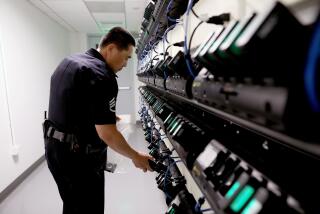U.S. Offers Plan to Curb Rogue Iraqi Police Forces
- Share via
BAGHDAD — U.S. military officials unveiled a plan Monday to combat chronic problems with renegade Iraqi security forces by creating Iraqi-led inspection boards and standardized uniforms.
The boards will conduct battalion-level reviews of police leadership and accountability, said Army Maj. Gen. Joseph Peterson, the top U.S. police trainer in Iraq. Battalions will be judged on how well they can track weapons and vehicles -- a response to the widespread use of equipment for criminal activities.
U.S. officials hope distinctive uniforms and standardized vehicle markings will make it harder for police to break the law and for criminals to impersonate police, Peterson said.
The plan is an acknowledgment by the U.S. military that neither it nor the Iraqi Interior Ministry has confidence in or control of Iraq’s police forces, which have been accused of operating death squads and kidnapping rings.
“It appears that there are some individuals who have joined the ranks of the Ministry of Interior forces [who] still have allegiances and are in fact working with their militias,” Peterson said.
But he acknowledged that the plan would not apply to some security forces, including the 140,000-member Facilities Protection Service, which posts armed guards at government buildings. Those officers wear uniforms and drive vehicles similar to Interior Ministry forces but are unaccountable to police, the army or the U.S. military.
Peterson also said that as many as half of Fallouja’s 1,700-member police force had failed to report to work this month after a reported threat by insurgents to kill anyone who showed up for duty. Some reports indicated that all but 100 of the officers had failed to report for work.
Peterson discounted reports of intimidation, saying that the officers had stayed home to protest an Iraqi judge’s early release of insurgents this week, but that the officers had since returned to their jobs.
Meanwhile, U.S. military and Iraqi accounts of explosions Sunday in Baghdad’s Zafaraniya neighborhood differed.
Interior Ministry officials Monday stood by reports that Sunni Arab insurgents were to blame for blasts that killed an estimated 58 people, injured 148 and destroyed three buildings and 23 cars in a predominantly Shiite Muslim area.
But U.S. military spokesman Army Maj. Gen. William B. Caldwell IV said the blasts were caused by “an internal gas explosion that set off a series of other explosions.” He said there was no evidence of insurgent involvement.
Caldwell reiterated recent claims by Zalmay Khalilzad, the U.S. ambassador to Iraq, that Iranian agitators were playing a divisive role in Iraq.
“We do in fact have evidence that weapons, munitions that postdate the time period in which Saddam [Hussein] was removed from power have been found here in Iraq that were of Iranian origin,” Caldwell said. “We do know that Shiite extremist groups have received training through some sort of third element associated with Iran. We do know that weapons have been provided and [improvised explosive device] technology has been made available to these extremist elements.”
Caldwell stopped short of accusing the Iranian government of direct involvement in attacks against Iraqi or U.S. forces.
In Ramadi, where Marines are working to secure a large area, Iraqis said they saw a roadside bomb destroy a U.S. Humvee. Four U.S. soldiers died in a firefight that followed, the residents said. The U.S. military would not confirm the report.
In the northern oil hub of Kirkuk, gunmen killed Sheik Badr Hashim Hajim, a Sunni Arab tribal chief, authorities said. Mohammed Khalil, a Sunni Arab member of the Kirkuk governorate council, said the targeting of tribal sheiks had increased. This month, Abdul Razaq Niama, a Sunni Arab politician, was assassinated.
Sunni Arabs are a minority in the predominantly Kurdish city, which has significant Turkmen and Shiite populations. Both Hajim and Niama migrated to Kirkuk under a Hussein-era program aimed at ridding the city of Kurds. Since 2003, Kurdish refugees have moved back in droves.
In Baqubah, 35 miles northeast of Baghdad, a roadside bomb killed two motorists and injured three others. In Baghdad, two separate car bombs killed three Iraqis.
Police in Zubair, a Sunni suburb of the Shiite southern port city of Basra, said they had broken up a human trafficking ring. Police said they arrested six men and three women who had been smuggling impoverished women to the Iranian city of Abadan.
“The women were sold there,” a police officer said. “Most of the women being smuggled are from very poor families or were having family problems. The gang members tempted them with money and then they smuggled them.”
Also in Basra, demonstrators protested persistent electricity blackouts in triple-digit temperatures. The protesters burned tires and clashed with police. Residents said ambulance sirens could be heard throughout the city.
*
Times staff writer Ali Windawi in Kirkuk and special correspondents in Baghdad, Basra, Baqubah and Ramadi contributed to this report.
More to Read
Sign up for Essential California
The most important California stories and recommendations in your inbox every morning.
You may occasionally receive promotional content from the Los Angeles Times.













